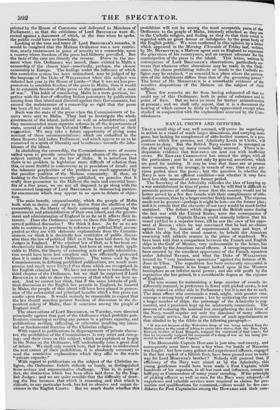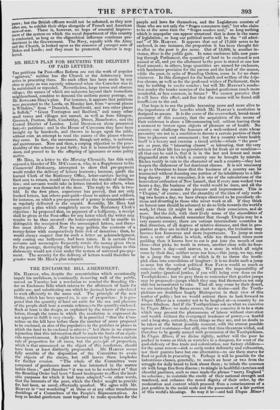NAVAL CREWS AND OFFICERS.
THAT a small ship of war, well manned, will prove its superiority in action to a vessel of much larger dimensions, and carrying more guns, but lacking its complement of able-bodied seamen, is a pros position which few persons, not Admiralty Lords or Clerks, will venture to deny. But the British Navy seems to be managed on the plan of keeping up many vessels badly manned. There is in-
disputable evidence that first-rates are sent out with inefficient crews. Sir EDWARD CODRINGTON has named the ships, with all
the particulars ; and he is met only by general assertions, which are good for nothing. It may be true that there are at present more seamen, on the average, in vessels of war, than at any pre- vious period since the peace ; but the question is, whether the Navy is now in an efficient condition—not whether it may have been less ably manned at some former period. The Secretary of the Admiralty ridicules the idea of keeping up a war establishment in time of peace : but he will find it difficult to persuade persons of ordinary sense that the country would not be
better served by a few fine vessels with their complements of able- bodied seamen, than by a larger number feeblymanned. The expense needs not be greater—perhaps it might be less—on the former plan; and it is certain that the character of our navy would be much better sustained. The defeats which disgraced the British name during the last war with the United States, were the consequence of under-manning. Captain DACRE could scarcely believe that his vessel yielded to a superior force, till he saw the crew of his oppo- nent at Boston ; when he was convinced that he had no chance against her ; for, instead of superannuated men and boys, of Which his ship had the usual muster, he beheld the American swarming with athletic seamen in the prime of manhood. We have been told that a comparison between the French and English ships in the Gulf of Mexico, very unfavourable to the latter, has been made by the American naval officers. A strong impression has been created by the excellent appearance of the French squadron under Admiral %nom, and what the Duke of WELLINGTON termed its "very handsome operations" against the fortress of St. Juan de Ulloa. Time expedition has been eminently successful in that 'respect. France is no longer looked upon in the Western hemisphere as an inferior naval power ; and she will profit by the reputation she has gained, in a considerable degree at the expense of England. The true reason for maintaining a large number of vessels in- differently manned, in preference to fewer with picked crews, is not openly stated on either side in Parliament ; but it is not far to seek. The same officer who commands a weak, might, with greater ease, manage a strong body of seamen ; but by scattering the crews over a larger number of ships, the patronage of the Admiralty is aug- mented, and a provision kept up for aristocratic connexions. The process of reducing the nominal but strengthening the real force of the Navy, would require not only the dismissal of many officers from actual service, but the prevention of such appointments as that alluded to by the Globe in the following paragraph- " It was not because of the Wolverine sloop of war being ordered from the Malta station to the coast of Africa to cruise after slaves, that the lion. Capt. Howard, brother of Lord Morpeth, resigned the command of that vessel ; but that he necessarily resigned the command of a sloop of war on his being pro- moted to the rank of Post Captain."
The Honourable Captain Howann is just nine-and-twenty, and consequently must have been a boy when the battle of Navarino was fought : but how many gallant and experienced officers, engaged in that last exploit of a British fleet, have been passed over to make way for Lord MORPETH'S brother ? Nobody will pretend that, if efficiency of the Navy were aimed at by the Admiralty, this young gentleman would have been made a Post Captain, while hundreds of his superiors, in all but rank and influence, remain on half-pay as Commanders of many years' standing. If the principle of picking officers as well as men for the Navy were adopted,—if experience and valuable services were required as claims for pro- motion and qualifications for command,—there would be few can- didates for Post Captaincies among the HOWARDS and their corn- peers; but the British officers would not be ashamed, as they nolv often are, to exhibit their ships alongside of French and American men-of-war. There is, however, no hope of essential improve- ment of the system on which the naval department of this country is conducted, as long as the oligarchical influence continues pre- dominant in the Government. The Navy, equally with the Ariny and the Church, is looked upon as the resource of younger sons of Dukes and Lords ; and they must be promoted, whoever is neg-



























 Previous page
Previous page